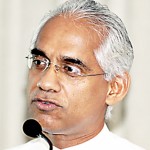Cleaning up banks? Process imperfect but has to be done, says Deputy Minister
Good governance essentially means that the Executive, Judiciary and the Legislature have to be independent of each other’s functions. It also means the establishment of the rule of law, said the Deputy Minister of Highways, Investment Higher Education Eran Wickramaratne at a panel discussion of the Government’s 100-day programme at the monthly meeting of the Sunday Times Business Club (STBC) in Colombo on Thursday.
The other two panelists were JVP Member of Parliament Vijitha Herath and Amal Sanderatne, economist and Head of Frontier Research.

The audience enjoys a joke by panellists. Pix by M. A. Pushpa Kumara
 Minister Wickramaratne said that good governance was also a cultural and a behavioural issue. He said the previous government even with a 2/3rds majority could not enact some important laws as the system was flawed. When President Maithripala Sirisena was the Minister of Health in the previous government he was powerless to enact laws pertaining to the health sector. Referring to the 19th Amendment, he said the President’s discretionary powers to dissolve a newly elected parliament after one year has been removed.
Minister Wickramaratne said that good governance was also a cultural and a behavioural issue. He said the previous government even with a 2/3rds majority could not enact some important laws as the system was flawed. When President Maithripala Sirisena was the Minister of Health in the previous government he was powerless to enact laws pertaining to the health sector. Referring to the 19th Amendment, he said the President’s discretionary powers to dissolve a newly elected parliament after one year has been removed.
Another salient feature of the 19th amendment is that the President will be the head of the armed forces while the Prime Minister will be the head of the government and the executive. “We are looking at the French constitution where the President is elected by the people and the Prime Minister is chosen from a party that wins the most number of parliamentary seats. Under certain circumstances the President will act on the advice of the Prime Minister and when the Prime Minister loses the confidence of the house, a new Prime Minister will be appointed,” he said.
Asked about the process of ‘cleaning up’ cronies in boards of banks and other institutions, he said that the way forward was imperfect but “we are

Amal Sanderatne
forced to use imperfect methods to put things right”.
He said the role of the Central Bank is essentially to ensure whether people are fit and proper to serve on bank boards. That is their only role. The former Governor had a smooth way of putting people on bank boards.
“So how do we clean up the banks? It was not the best way (to replace others) but it has to be done like in the case of the former Chief Justice.”
Queried during question time on the suspension of road projects which has affected the incomes of road-works workers and small businesses, he agreed that road projects need to re-start quickly, and pointed that last week the Government committed Rs. 8.2 billion on road development.
Economist Sandaratne said that no one was able to predict a slump in the world oil prices in the past six months. A drop in the oil prices was a boon to the country’s economy. He said the economy has been coming from a very depressed state and the country’s reserves have been falling sharply during the last six months. Although there was growth in the GDP consumption dropped with people not

Vijitha Herath
having enough money to spend. The consumption number of the Central Bank had been worse during the past 15 years. He also cautioned that funding from global capital markets will become harder in the future. With benefits provided in the budget the situation is expected to rebound. But with the prevailing political uncertainties one cannot expect much foreign investment. The country’s debt repayment too has ballooned, he said.
Referring to the Indian subcontinent, he said that many foreign investors are looking at investing in India owing to the liberalisation of the market economy undertaken by Prime Minister Narendra Modi’s government.
JVP MP Vijitha Herath, referring to the 100 day programme of the government, said his party’s slogan prior to the Presidential Election was to defeat President Mahinda Rajapakse to preserve democracy. “Following the election we indicated to the government that we would support the 100 day programme. Our main objective was to abolish the Executive Presidency and to reduce corruption in the government.” He jokingly said that this government could not be called a national government as some unwanted ministers too were also in the government. If there was to be a national government there should

Eran Wickramaratne
be a national policy. “Our target was somehow to pass the 19th amendment. Some SLFP MPs are making various negative utterances though privately they say they support it.” He said the JVP was disappointed that concrete action was not taken against some corrupt politicians. He said the JVP was not against the private sector but there should be a national economic policy prepared by the government where the private and the state sector could participate.
He said they had no confidence in the Bribery Commission as the commissioners were appointed by the former president. “But the commission has powers to stop people going abroad. That was our intention in initially filing complaints with this institution,” he said.
The JVP MP also said that they were unhappy about the entry of S.B. Dissanayake and Pavithra Wanniarachchi into the cabinet, saying the Government will now not take action on alleged corruption against them.


